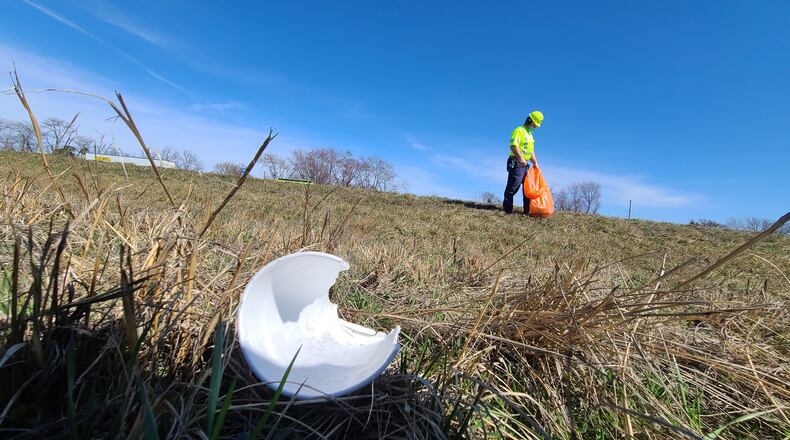“This money could be better spent if people would simply keep trash in their vehicle and secure items they are hauling,” said ODOT spokesman Matt Bruning. “There is zero excuse for litter ending up along Ohio roadsides.”
March and April are the two big months for collecting trash in Ohio, Bruning said. In the winter, most of ODOT’s time is spent plowing snow and treating for ice.
The cost to collect trash in the Miami Valley — including Butler, Clarke, Darke, Greene, Miami, Montgomery, Preble and Warren counties — has risen by about 22% in the past five years, from a total of $362,854 in 2015 to $462,957 in 2020, according to ODOT.
In those same counties, ODOT collected 5,741 more bags in 2019 than 2015. However, ODOT picked up 1,334 fewer bags of trash within the Miami Valley in 2020 than they had in 2015.
Statewide, the cost has risen about 22% in the past five years, from $3,701,042 in 2015 to $4,732,532 in 2020.
Those statistics only include ODOT’s jurisdiction, not county roads or city streets
The trash comes from people throwing it out of their cars, but also from items falling off trucks and cars.
Since many of the people picking up litter are ODOT employees, Bruning says picking up litter keeps them from tasks such as filling potholes and mowing grass in the summer. ODOT spent about 151,410 hours cleaning up trash last year in Ohio, Bruning said.
The state does use inmate labor to clean up trash, he said, but that isn’t free. The state then has to pay for the costs of guards for the prisoners and a portable toilet, since prisoners can’t just go to a gas station.
He said another option to clean up the roads is the Adopt-A-Highway program, where volunteers go out and pick up trash along the highway. But even then, the state still pays for trash bags, he said.
“The cheapest solution is just not to litter in the first place,” Bruning said. “That’s free.”
Bruning said there can be an environmental cost to throwing trash out the window too. On I-75 through downtown in Dayton, the highway is drained in the median. When storm drains get clogged with litter and a heavy rainfall happens, the roads are more likely to flood.
Dana Doll, manager for Environmental Services in Greene County, said the county uses volunteer crews to clean up county and township roads. They currently have about 20 spots. Crews pick up an estimated 100 bags of trash in a year, she said. The cost to the county is minimal because the county only provides bags and safety gear.
But roads in the Adopt-A-Spot program must be approved because some roads are too dangerous for anyone to be on, she said. Those roads don’t get cleaned up.
Doll said litter can be dangerous for people mowing. Cans and bottles can puncture tires, or fly up into a motor, which then costs the local government money.
She said littering was not acceptable behavior.
“Anywhere people go there is an option to dispose of their waste,” she said. “We shouldn’t have to have litter collection.”
Dani Damon, a spokesman for Montgomery County Environmental Services, said the Montgomery County Environmental Crimes Task Force provides two deputies for litter control and environmental enforcement. The litter control officer uses inmate labor to clean over 250 roads annually.
In 2019, the inmate crew put in 4,902 hours to collect 132,860 pounds of roadside litter and debris. The 2021 estimated budget for the contract is $254,550, she said.
The inmate program is not currently operating due to COVID-19.
Bruning said it was frustrating that the amount of effort put into cleaning up trash can be easily erased after just a few days.
He said he had heard a story from a District 8 administrator in Cincinnati who were cleaning up an interchange with I-75. They even raked the area to get all the cigarette butts out, Bruning said.
“He said, man, they had it spotless, and the next day they drove by and someone had chucked a White Castle bag with slider boxes all over the place,” Bruning said. “It’s just demoralizing, you know, because think like, man, we spent all that time yesterday doing that, and now look at it.”
By the numbers:
Cost to clean up litter per county in 2020, according to ODOT:
Butler $27,556
Clarke $28,866
Darke $16,230
Greene $40,038
Miami $39,671
Montgomery $162,353
Preble $42,325
Warren $105,918
Contact Eileen McClory at 937-694-2016 or eileen.mcclory@coxinc.com.
About the Author


